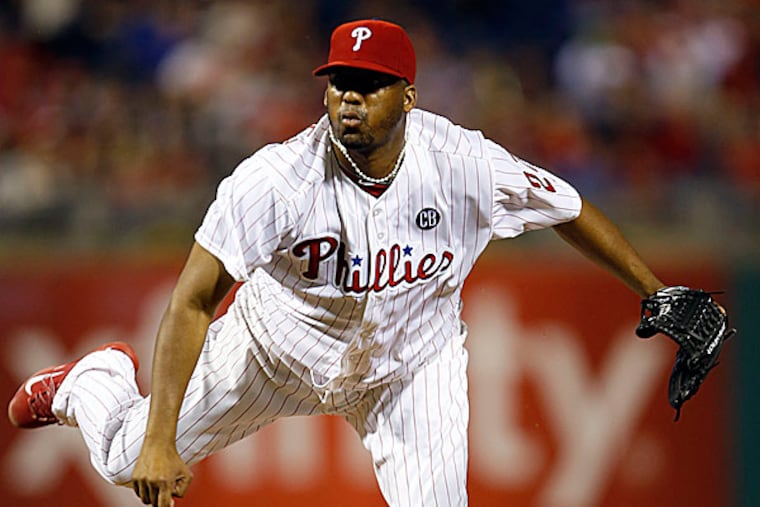Starters play a role in Sandberg's long nights
Ryne Sandberg is all about extra work. He believes that his dogged approach during his playing days was as responsible for his Hall of Fame career as his obvious athletic talent.

Ryne Sandberg is all about extra work. He believes that his dogged approach during his playing days was as responsible for his Hall of Fame career as his obvious athletic talent.
The Phillies manager, however, pleaded guilty to clock watching Tuesday shortly before his team's game against the Atlanta Braves was postponed by the blustery afternoon rain that hovered over Citizens Bank Park. Sandberg can't believe how close to midnight it has been when he leaves work.
"For me, the game starts with pitching and defense," the manager said. "I think overall our pitchers have to establish the strike zone and work ahead in the counts. That has been a big part in why we're [having] one of the slowest games and longest games in baseball, I think. Every time I look at the clock [to] leave, it's almost midnight. I can't believe it, but it is what it is."
The Phillies' average time of game this season has been 3 hours, 17 minutes. Only the Los Angeles Dodgers and Chicago Cubs are taking more time to reach the finish line.
Sandberg didn't mention the time it's taking for his team to get through nine innings because he's eager to get home and watch Mike Trout's games on the West Coast. Rather, he believes it has been part of the team's problem through the first 13 games.
The natural reaction of anyone who watched Monday night's gut-punching loss to the Braves was to blame the bullpen. You wouldn't be wrong, but you wouldn't be entirely right, either.
B.J. Rosenberg and Jake Diekman used their arms as rocket launchers, surrendering a combined four home runs and seven runs. Rosenberg did something that hadn't been done by a reliever in at least a century when he faced three hitters and allowed a home run to each one. Diekman, meanwhile, played the part of human deflation device by serving up a grand slam to Dan Uggla that instantly erased the euphoria supplied by Domonic Brown's three-run, go-ahead homer the inning before.
Sandberg raised some eyebrows when he said in reference to his bullpen that "overall I would say that the guys have done a fine job competing and giving us a chance to win games."
The bullpen's National League-worst 5.53 earned run average would indicate otherwise, but Sandberg wasn't just trying to protect his young relievers. He believes that his starters need to shoulder some of the blame, too.
On the surface, the rotation's 4.05 ERA isn't awful. The problem is that Sandberg is waving for his bullpen much sooner than he would like, and that's making for a weary bunch of relievers. You could argue that it's early in the season, but any time a reliever has to pitch three days in a row it takes its toll.
Rosenberg, Diekman, Antonio Bastardo, and Jonathan Papelbon have had to do that already this season.
"It's not easy pitching out of the bullpen," Papelbon said. "It's not at all. It's tough to do on a daily basis. You pitch sore and fatigued and beat up a lot of days, and I think that's one of the biggest things to learn. You have to learn how to pitch feeling that way and how to use your strengths on those days because those are the days that really count. I think we're starting to learn that as a group."
Mark down Monday's lesson as a painful one for all involved. Sandberg thinks the education would be a little easier for his young relievers if his experienced starters would begin covering more innings by throwing more strikes.
Only two starters - Kyle Kendrick in the third game of the season in Texas and Cliff Lee in the fifth game in Chicago - have pitched beyond the sixth inning this season. The starters have lasted five or fewer innings in five of the 13 games.
The starters have walked 30 batters - tied for the second most in baseball before Tuesday's games - and have a 1.61 WHIP (walks and hits allowed per inning), the second-worst total in the majors.
"It's hard to tell what it might be, but the guys are working on that," Sandberg said. "Whether it's early in the season, I don't know. Whether they're trying to be a little bit too perfect, I don't know."
The best solution to the rotation's problem appears to be on the horizon: Bring back Cole Hamels, one of the two leftovers from the Four Aces era when the Phillies' starters routinely covered seven or more innings and the manager usually arrived home long before midnight.
After one more rehabilitation start, Hamels is expected to rejoin the rotation next week in Los Angeles.
"When you have a few starters going seven innings and you're talking about covering two innings instead of three, that makes a big difference when you're looking at a week's worth of bullpen use," Sandberg said.
If that doesn't happen, the clock will strike midnight on the Phillies long before the postseason.
@brookob